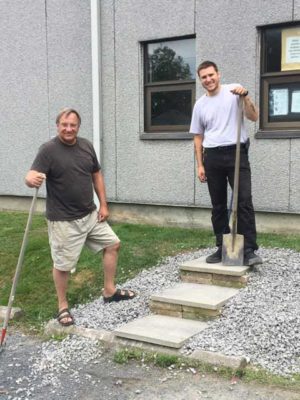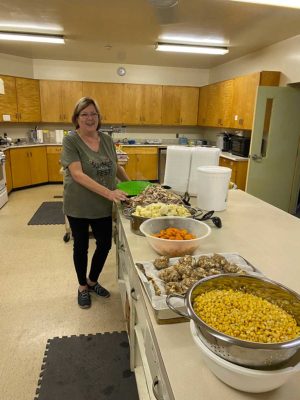It was almost one year ago when Taylor Seguin, Centre 105’s young program co-ordinator, stepped into his new job on Mar. 1 after the Rev. Peter Cazaly who founded the drop-in centre in Cornwall, Ont. retired. He started just in time to be in charge when the pandemic hit.

The year “has flown by so quickly with an amazing amount of learning,” Seguin told Crosstalk in a telephone interview. “I’d never spoken to a health unit or half the people we’ve had the chance to work with, so it’s been fun. But now I don’t know what it would be like not in the pandemic.” He added that everyone has learned to be adaptable and hopes that willingness to try new things will outlast the COVID-19 crisis.
The pandemic increased demand for the services Centre 105 provides — breakfast three days a week— as well as a caring community. Seguin says that in the fall the number of people coming for meals rose to about 60 to 70 people a day, and occasionally peaked at nearly 80. “Those are the days that are a bit scary because you think, ‘Oh my God, why is there so much need all of a sudden?’” Fortunately, he said, the other food agencies in Cornwall, such as the Agape Centre, which operates a soup kitchen, food bank and thrift store, were also adapting, and the agencies collaborated more closely to meet people’s needs. A Walmart distribution centre in Cornwall would donate crates of products to the Agape Centre, which shared goods with Centre 105, for example. “With all of us communicating a bit more and swapping supplies, it’s been really nice, and I think 2021 will bring even more of that collaborative mindset.”
Seguin said he and the staff were pleased when the local health unit gave the centre permission to serve food inside the hall at Trinity Anglican Church in November and December when the region was in a yellow risk category. People still had to wear masks and social distance at small individual tables, but it was a welcome shift from participants just having to pick up their food at a window from outside.
“We ask people all the time ‘What do you find the hardest?’ and it is the isolation. The lonely factor is really starting to eat away at people,” Seguin said.
The challenges Centre 105’s clientele face daily, such as a lack of access to public washrooms, are coming to light, he added. “We noticed, ‘Wow, a lot of people are asking to use our washroom,’ more than normal. It is a tough call because letting people in the building [requires] sanitizing afterwards and stuff like that, but it is directly linked to the fact that [public washrooms are] not accessible or available.”
Seguin is often asked if there is a homeless population in Cornwall. There definitely is, he said, but it is more of a hidden problem than it might be in large cities. “We have a lot of people who couch surf and a lot of people who live in rooming houses. People who live in rooming houses are often the ones looking for a washroom in the middle of the day. In a lot of cases, the rooming house is a bed and somewhere they hang their hat at night,” but it is not a place where people stay during the day.
Centre 105 was able to continue serving food inside until Christmas. Participants enjoyed a Christmas meal on Dec. 23, but once the second lockdown in Ontario was announced, staff and participants had to adjust to using the improvised take-out window again.

During the pandemic, Seguin and the staff noticed that the types people they were serving were changing. “Some of our older participants have stopped coming because of the danger of the virus. As those regulars started to not show up, we wondered why our numbers were staying the same or increasing, but it was a [new] population of people who had never accessed food agencies before. [They were people] who were in their mid-20s and had just lost a job, so those people really boosted our numbers.”
The centre tries to welcome this young adult population, Seguin said. “We really try to provide that comfortable, warm, atmosphere, non-judgemental. The staff and the volunteers are awesome. It feels like home, that’s the vibe that we are trying to give off, so after they come a few times most people feel pretty comfortable.” He noted that they are also seeing more women coming to the centre. Participants used to be about 75% middle-aged men, but now Seguin estimates it is almost 50% women.
There have been many blessings to help Centre 105 keep up with these increasing needs, Seguin said. “We were expecting to have a terrible year both financially and with in-kind donations of food and supplies, but it was the opposite.” They received so many donations from restaurants, they were overwhelmed with the supplies and by people’s generosity.
“There’s a small local diner in Cornwall, called The Village Diner…. They donate 30 loaves of bread a week, which is phenomenal, and they’ve been doing that since the beginning of the pandemic.” And that restaurant is not alone. A lot of restaurants and a lot of service clubs reach out and donate. The centre also benefitted from the unfortunate closure of another restaurant whose owners donated a lot of supplies and equipment. Centre 105 received those gifts “with mixed emotions because it is great that we were able to get new equipment and upgrade our operation but sad to see someone else put their passion to rest,” Seguin said.
“We can hardly keep up with who is giving what,” said Seguin, adding gratefully that 2020 expenses for food and programming are a lot lower than anticipated as a result. They were similarly blessed with a flood of people calling to volunteer, but due to COVID restrictions they’ve had to limit the number of volunteers, to focus on students who need volunteer hours to complete their high school community hours.
The centre does have some growing pains. Until now, breakfasts have been cooked on electric griddles, but the griddles really aren’t big enough to serve the larger numbers of participants now, so the centre has to find a way to purchase and install a commercial-sized grill and hood.
“We’re so lucky to have the cook we have, Lorraine Kouwenberg, because she is one of those people who can make something out of three ingredients on a countertop. It’s amazing what she can pull off with the supplies that we give her. I’m excited to see what we could do with great equipment.”


Saint Mary’s Church, Westmeath — Deanery of the Northwest